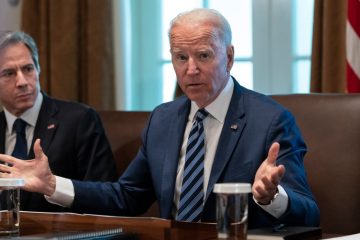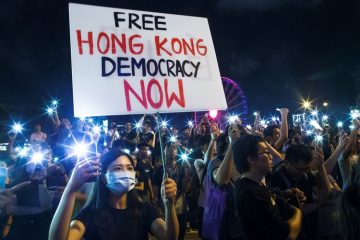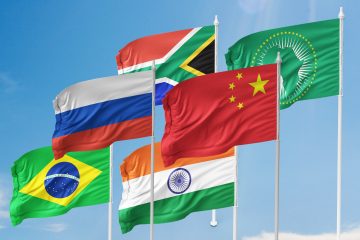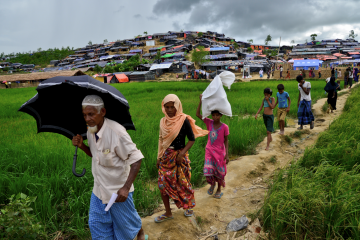
Variable Geometry: What Washington is Getting Wrong
The new buzzword echoing through the halls of the White House is variable geometry. Faced with a panoply of transnational threats, the Biden administration is building fit-for-purpose coalitions between countries and other stakeholders, including local governments, the private sector, NGOs, and academia. Coalitions have been formed to address discrete policy challenges, including COVID-19, food security, providing aid to displaced Ukrainians, and most recently, synthetic opioids. In times of polycrisis, variable geometry suggests that the “America First” policy is no longer viable. Yet, the diplomatic currency of the United States remains zero-sum; official statements about defending the liberal world order continue to echo the end of history thesis, without accounting for the growing demands of middle powers – particularly those in …

ISRAEL AND IRAN: WHAT NEXT?
With this month’s direct military strikes against each other, a war between Israel and Iran becomes not only conceivable but a growing risk. For all Israel’s advantages and determination, with the most sophisticated military in the region and an innovative and resilient economy, it is a small country of less than ten million people. Iran is a large country of over 80 million people whose economy and military capabilities have survived years of crippling sanctions. The outcome would depend on who had the strongest external support. For the time being, Israel has firm international friends and allies, as Iranian diplomats recognise. But that international support is under strain from the Israeli government’s refusal to consider any negotiations with the Palestinians …

Can the Pro-Democracy Hong Kong Lobby Still Influence Western Foreign Policy?
During the 2019 Anti-Extradition Bill protests in Hong Kong, activists made extensive efforts to internationalize their movement, engaging in public diplomacy and lobbying foreign governments to support their cause. The Hong Kong pro-democracy lobby—a loose coalition of individuals and organizations aiming to steer Western foreign policy in a direction they believe will benefit Hong Kong’s democratic prospects—emerged amidst this unprecedented grassroots mobilization. Four years on, however, the Hong Kong lobby is facing an uncertain future. Activists are striving to overcome the barriers posed by transnational repression and reinvent their image in today’s fraught geopolitical landscape. Two factors explain the success of Hong Kong activists in constructing and consolidating their lobbying infrastructure in 2019. First, the expansion and transformation of the …

The Need to Institutionalise US Support for Ukraine in the Face of Electoral Uncertainty
As storm clouds gather on the horizon, the future of US support for Ukraine remains uncertain. Despite overall high levels of support among the American public, questions over how much money to commit to Ukraine and the looming uncertainty of the next US election cast doubt on the extent to which the US–the largest overall aid donor to Ukraine–can continue to provide support. Growing concerns about accountability and transparency raise further doubts about continuing such substantial support, especially with no end to the conflict in sight. Ultimately, in order to maintain the current level of US support for Ukraine, aid flows need to become institutionalised and predictable. This would allow for more strategic long-term planning on behalf of the US …

The 2023 BRICS Summit: A Mixed Bag for China
The 2023 BRICS Summit: A Mixed Bag for China Chinese President Xi Jinping’s visit to the 15th BRICS (Brazil, Russia, India, China, and South Africa) Leaders’ Summit in Johannesburg, South Africa from August 21-24 encompassed both diplomatic successes and self-inflicted setbacks. While China effectively championed BRICS expansion, missteps by the Chinese delegation detracted from the trip’s achievements. Beijing sees BRICS as key to engaging the Global South and countering the West China sees BRICS as a valuable and unique mechanism for engaging with the Global South. In July 2023, ahead of the BRICS summit, China’s top diplomat Wang Yi described BRICS as “the most important platform for cooperation among emerging markets and developing countries.” BRICS summits allow Chinese officials to …

Geopolitical challenges hamper Rohingya repatriation from Bangladesh
The Rohingya refugee crisis as a trigger for displacement For decades, the Rohingya, a predominantly Muslim ethnic group in Myanmar, have sought refuge in neighbouring Bangladesh to escape persecution. This influx, particularly since 2015, has strained Bangladesh’s limited resources. The persecution of the Rohingya is a textbook case of ethnic cleansing by Myanmar’s civilian-military government. With around one million Rohingya refugees in Bangladesh, concerns have been raised about the safety of the host population . Despite intense diplomatic efforts, Myanmar, governed by a military junta since 2021, remains reluctant to repatriate its Rohingya nationals, causing frustration in Bangladesh. Previous repatriation attempts in 2018 and 2019 failed due to the Rohingya refugees’ fear of violence upon return. In Rakhine State, where …









